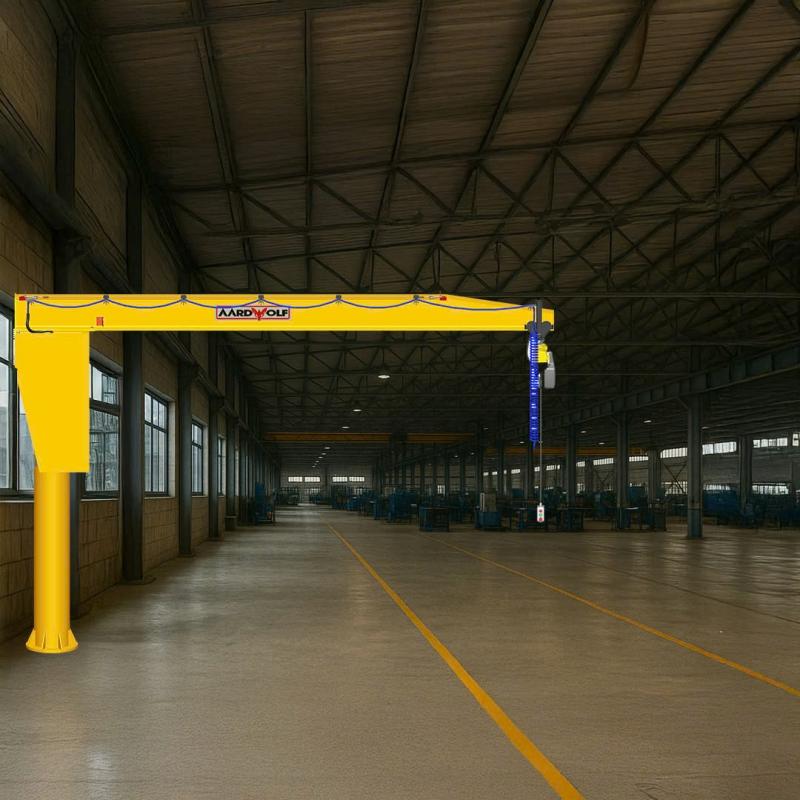



Whether you're working with a freestanding jib crane, wall mounted jib crane, or articulating jib crane, understanding load capacities ensures that your operations remain efficient and compliant with safety standards.
This guide covers everything you need to know about jib crane load capacities, including types, capacity ranges, real-world applications, and critical buying considerations. It also highlights examples from Aardwolf, a trusted manufacturer known for innovative crane solutions for various material handling needs.
Explore The innovation of Jib Cranes to discover more about high-performance solutions tailored for your workspace.
A jib crane’s load capacity determines how much weight it can safely lift and rotate. Exceeding these capacities can lead to catastrophic failure, endangering personnel and damaging goods or infrastructure.
Correct load rating selection depends on several factors:
Type of materials handled
Frequency of lifts
Span and rotation requirements
Installation type and support structure strength
To understand the variety of crane configurations, visit How to handle Jib Cranes.
Freestanding jib cranes offer the highest flexibility in rotation (up to 360°) and are commonly used in central warehouse or manufacturing locations.
Typical Load Range: 250 kg to 2000 kg
Example: Custom Aardwolf units with long boom arms designed to handle pallet loads or heavy machinery components.
These cranes are ideal when floor space is limited. They're mounted on structural walls or columns and allow up to 200° rotation.
Typical Load Range: 125 kg to 1000 kg
Installing wall-mounted jib cranes requires structural integrity and precise wall anchoring for safe performance.
Suspended from overhead beams, these cranes eliminate floor obstructions and are ideal for long-span lifting within confined layouts.
Typical Load Range: 250 kg to 1000 kg
These units must be installed where ceiling infrastructure can support dynamic loads.
With dual-arm pivots, these cranes allow for complex movement around obstacles.
Typical Load Range: 125 kg to 500 kg
Explore the jib cranes in industrial warehouse like Aardwolf’s AJCAWM model, which enables access into machinery or corners with pinpoint accuracy.
These are heavy-duty cranes mounted on custom-fabricated steel pillars or building columns.
Typical Load Range: 500 kg to 2000 kg
Used in facilities needing repeated heavy lifting at specific work zones.
Client: Metal shop in Victoria
Crane: 4m-250 WMJC
Use: Lifting 200 kg steel sheets onto CNC laser beds
Result: Reduced loading time by 30%, freeing operators for other tasks
Client: Brisbane-based pick-and-pack center
Crane: 5m boom, 360° rotation
Use: Repetitive 300–600 kg box lifts
Result: Faster palletizing, no wall anchoring needed
Client: Melbourne automotive plant
Crane: AJCAWM wall-mounted unit
Use: Install engine blocks up to 350 kg
Result: Maneuverability in tight spaces, single-operator control
To choose the right jib crane, consider:
Maximum Load Weight: Know the heaviest item to be lifted.
Lift Frequency: Frequent lifts = higher wear = need for buffer capacity.
Span and Rotation: Larger spans increase moment forces, requiring stronger builds.
Support Surface Strength: Ensure floors or walls can withstand imposed loads.
Tool Attachments: Account for weights of slings, hoists, and grabs in the total capacity.
Use The difference between crane and jib cranes to help compare different lifting systems if you're unsure whether a jib crane is right for your application.
Correct installation is as vital as the crane’s design. Misaligned mounts or poor foundations can reduce rated capacity by 50% or more.
Use certified anchor bolts for floor/pillar models
Perform pull-out tests on wall fasteners
Ensure boom arms are level under load
Allow full rotation clearance
Install electrical limits or bump stops where needed
For full installation instructions, see A key to install jib cranes.
All Aardwolf jib cranes are tested to international lifting safety standards. When choosing a crane, ensure:
It complies with AS 1418 or equivalent
Load testing certificates are provided
Periodic inspection and servicing is planned
Pro tip: Conduct annual dynamic load testing to verify your system’s strength under real conditions.
What is the maximum load we’ll lift?
Do we need rotation flexibility (180° or 360°)?
Should we anchor to the floor, wall, or ceiling?
How often will the crane be used per shift?
Is there potential for future capacity expansion?
If your facility has changing layouts, consider modular designs such as counterbalance or portable cranes that allow repositioning.
Choosing the right jib crane capacity is not just about safety—it's also about productivity. Undersized cranes limit efficiency, while oversized units may waste budget and space. Start by clearly defining your lifting needs and consult expert manufacturers like Aardwolf for custom solutions.
Visit The innovation of Jib Cranes to view complete product specifications.
For complex configurations, Installing wall-mounted jib cranes or Explore the jib cranes in industrial warehouse for articulated options may be ideal.
References
1. How to operate a Jib Cranes safely
3. Over brace jib crane wall mounted
5. Is a Jib Crane a Gantry Crane
6. Articulated Jib Crane Wall Mounted
8. Manual Counterbalance Crane
10. Over Braced Jib Crane Column Mounted
Sign up to receive the latest info on new Aardwolf products, special offers and more.
By signing up you agree to receive emails from Aardwolf with news, special offers, promotions and other information. You can unsubscribe at any time.